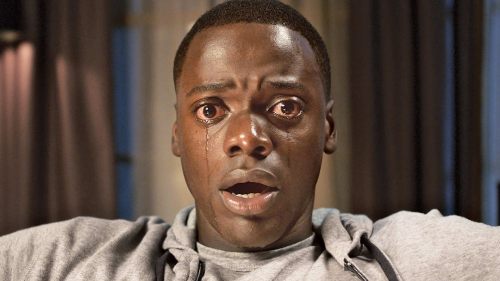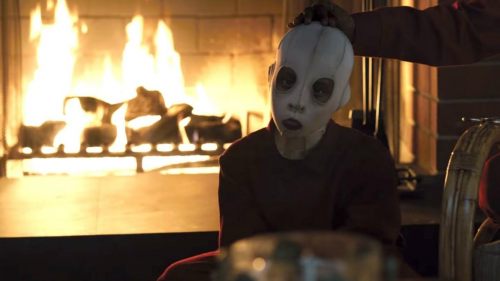DEATH NOTE Is An L Of An Honor For Lakeith Stanfield
Actor Lakeith Stanfield wasn’t familiar with the world of Death Note when he was cast as the enigmatic L in Netflix’s English-language adaptation of Tsugumi Ohba and Takeshi Obata’s hugely popular manga series (premiering this Friday). But once he landed the role, he did a deep dive into the material and thoroughly enjoyed what he saw.
“L is a brilliant person, which was very, very fun for me to investigate,” he says of the brilliant detective who opposes Light Turner (Nat Wolff), a high-schooler who literally acquires the power of life and death via a supernatural notebook. “I’m honored to have walked in the shoes of such an amazing character, and paid homage to the original manifestations in Japanese culture.”
Those manifestations include the original comics as well as an anime series and a live-action Japanese film franchise, and when it came to making the part of L his own, “I took immense inspiration from all of them, and also ignored them,” Stanfield notes. “I think both were necessary in order to bring about this character. I definitely wanted to create a sort of informed foundation from which to work, and so I watched [the anime and features] intently, listened to the Japanese soundtracks as well as the English dub so I could have a sort of voice reference, and also read the manga and saw how L was illustrated. I took in all of that information, and then I got together with Adam [Wingard, the director] and figured out what his own direction and vision were, and we worked together from there.”
“One thing that I was a big fan of in the original versions,” he continues, “was the sort of psychological exchange that occurs between Light and L. It’s just so brilliantly executed and carried out. I watched a lot of those scenes—the first meeting with L, the tennis-match scene where they have that banter—and I wanted to engage with Nat in a way that felt like it paid homage to that sort of exchange.”
The actor notes that he’s a fan of Japanese culture in general, “and I’m going to expand my knowledge of it in depth when I go to Tokyo soon to promote Death Note there. I’m very excited about that. I love their fashion, and their innovative thinking as far as technology and moving forward with that is concerned. I really enjoy it from the outside, and I’m looking forward to getting in there to learn more about it.”
Some enthusiasts for the country’s art have criticized this Death Note, and its casting of non-Japanese actors—grouping it in with the recent Ghost in the Shell and other Hollywood films that have appropriated stories from foreign countries. Stanfield, however, believes this disapproval is misplaced. “If you’re making a movie that’s an adaptation in your home country, obviously you’re going to fill it with people from that country,” he says. “I think that’s pretty obvious, and I never really understood that argument. This is an American adaptation, so obviously American actors will be part of it, and those demographics will reflect in the casting choices. But I do understand that a lot of Asian-Americans wish to see more of their faces in American cinema, and I agree that we should see that—not only Asian-Americans, but Native Americans, African-Americans, every different type of Americans. And that is happening; we’re on our way there.”
A good example of that this year is Jordan Peele’s Get Out, in which Stanfield plays Logan King, the party guest who delivers the titular warning to Chris (Daniel Kaluuya) and becomes key to discovering the story’s frightening secret. “I had never been creeped out on a set that much,” he admits. “Feeling like a foreign person in my own body was quite weird, and then, looking at my skin and talking to a bunch of white actors and extras about how beautiful dark skin looks on the fabric I was wearing, and things of that sort, became kind of disturbing after a while.”
Get Out had a high freakout factor with audiences too, leading it to become a sleeper hit and one of the most profitable films in recent memory. While he’s proud to have been a part of the movie, Stanfield was surprised by just how big it broke out. “We worked on a very humble budget,” he recalls, “and you never really have that kind of foresight when you’re making a film; it’s a very in-the-moment process. We didn’t know if audiences would even be receptive to the idea, let alone that it would take off the way it did. But I’m very glad about it; it became part of a discussion that is good for us to continue to talk about, and I hope people see the way in which the film sort of brings us together, rather than creating a separation. It shows that we all experience the same kinds of things—the feeling of being an outcast and so forth.”
Beyond its overwhelming success with the public, Get Out also received unanimous critical support—with one notable exception. Notorious contrarian Armond White gave the film a negative and typically misinformed notice that ruined its 100% Fresh rating on Rotten Tomatoes, prompting Stanfield to take to Twitter and proclaim, “Armond White is a bitch.” He quickly took the tweet down, but not before it received widespread enshrinement on numerous other websites.
The actor declines to comment on the comment and elaborate much on the sentiment, but he does have a thought about the fact that after describing Stanfield’s first scene, White stated, “The movie never shows us that character again,” not recognizing Stanfield’s significant role later in the film (a gaffe amended some time after the review first posted). “Well,” Stanfield says, “that must indicate that he’s a stupid bitch.”



